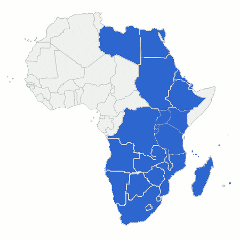It was recently announced that negotiations around the establishment of a single free trade area – spanning across 26 nations in Africa, also known as the Tripartite Free Trade Area – have been finalised, with the launch expected in May 2015.
The creation of this trade block is a positive step towards improved investment flow and the facilitation and flow of goods in the region. According to Jonathan Horn, MD of Maersk Line Southern Africa, the area will promote active trade between South Africa and the rest of the continent. “The growing African economy offers South African companies vast opportunities, and the establishment of one trade zone and economic community will only increase the opportunities available on the continent.” Horn explains that the main objective of the establishment of the Free Trade Area is seemingly to strengthen and deepen economic integration of the southern and eastern Africa region. “It will allow the enhancement of trade facilitation and improve the flow of goods in the region by reducing bureaucratic complexity, lowering transit times and the cost of trading.” He says that Africa is home to one of the fastest growing middle classes in the world, with many countries experiencing strong economic growth and rising disposable income. “The region presents a wealth of untapped opportunities for South African consumer-focused businesses looking to expand beyond borders,” he says.“Although the region offers so much potential, intra-African trade links remain weak.” According to research conducted by Ecobank only 12% of regional trade is conducted with other African countries. This is in comparison to Europe, where 60% of trade is conducted with its own continent.
“This highlights the opportunity to improve trade between South Africa and the rest of Africa, as well as how local companies can stand to benefit from exploring the region. The Tripartite Free Trade Area will reduce risks associated with trade in the region and essentially make Africa an easier place to do business – an opportunity that South African companies should explore.” As a result, says Horn, businesses will face decreased bureaucracy, red tape and administration costs when trading within the area, and will hopefully see improved operational efficiencies of border crossings and seaports. “These are all important factors, which will result in economic development and expanding inter-regional trade. The business community will benefit from an improved trade regime, which will reduce the cost of doing business with the rest of Africa. “As it becomes easier to do business with the rest of Africa we expect to see an increase in our South African customers trading with other countries in the region. Amongst others, the local manufacturing, retail and agricultural industries stand a chance to benefit greatly from trading with other African countries.”





